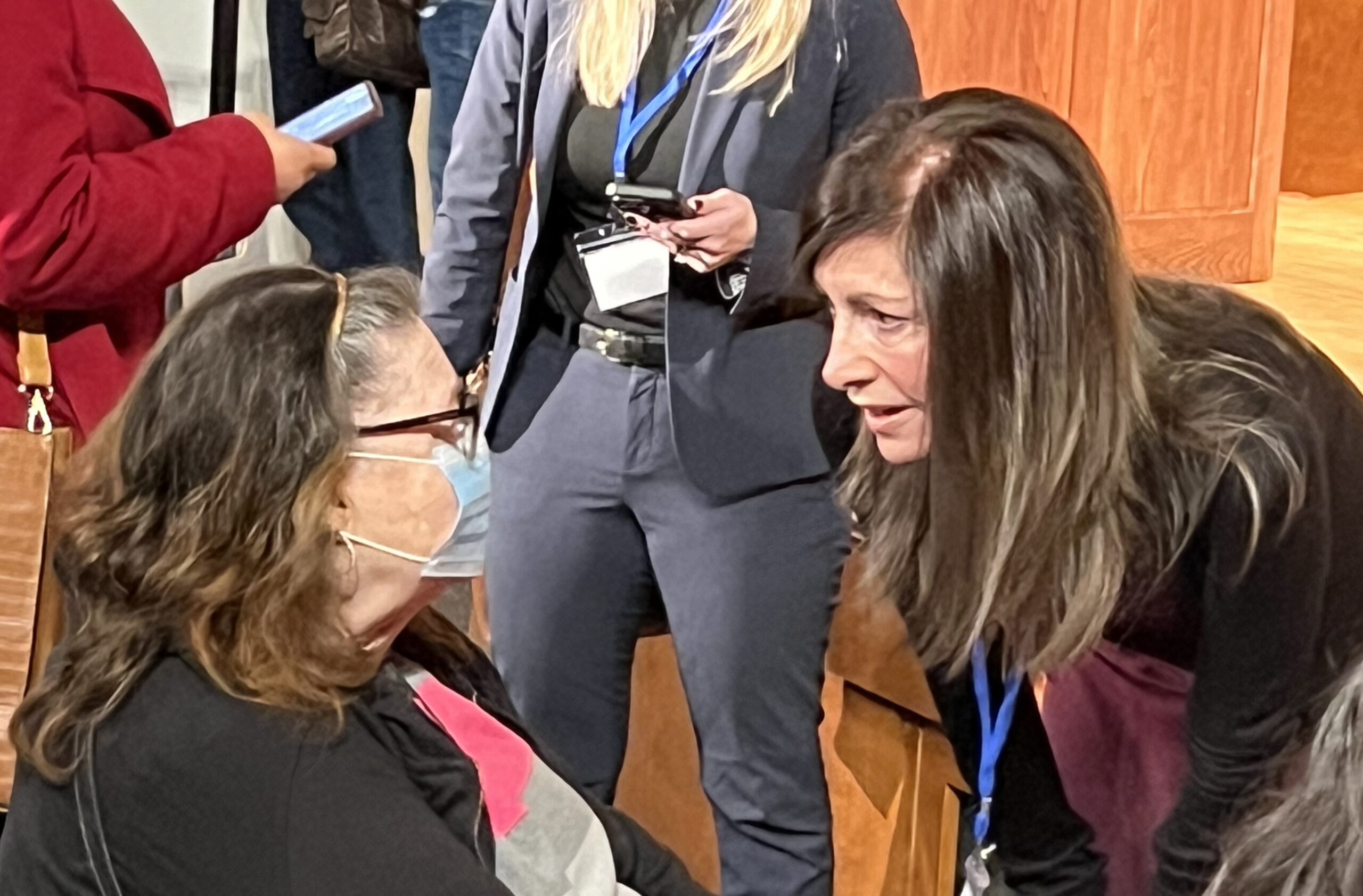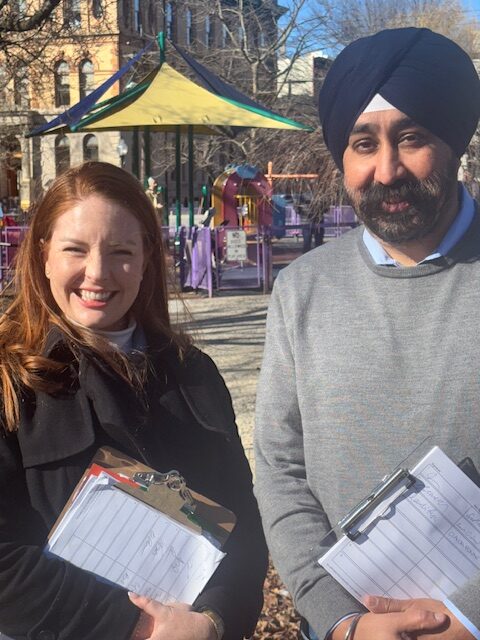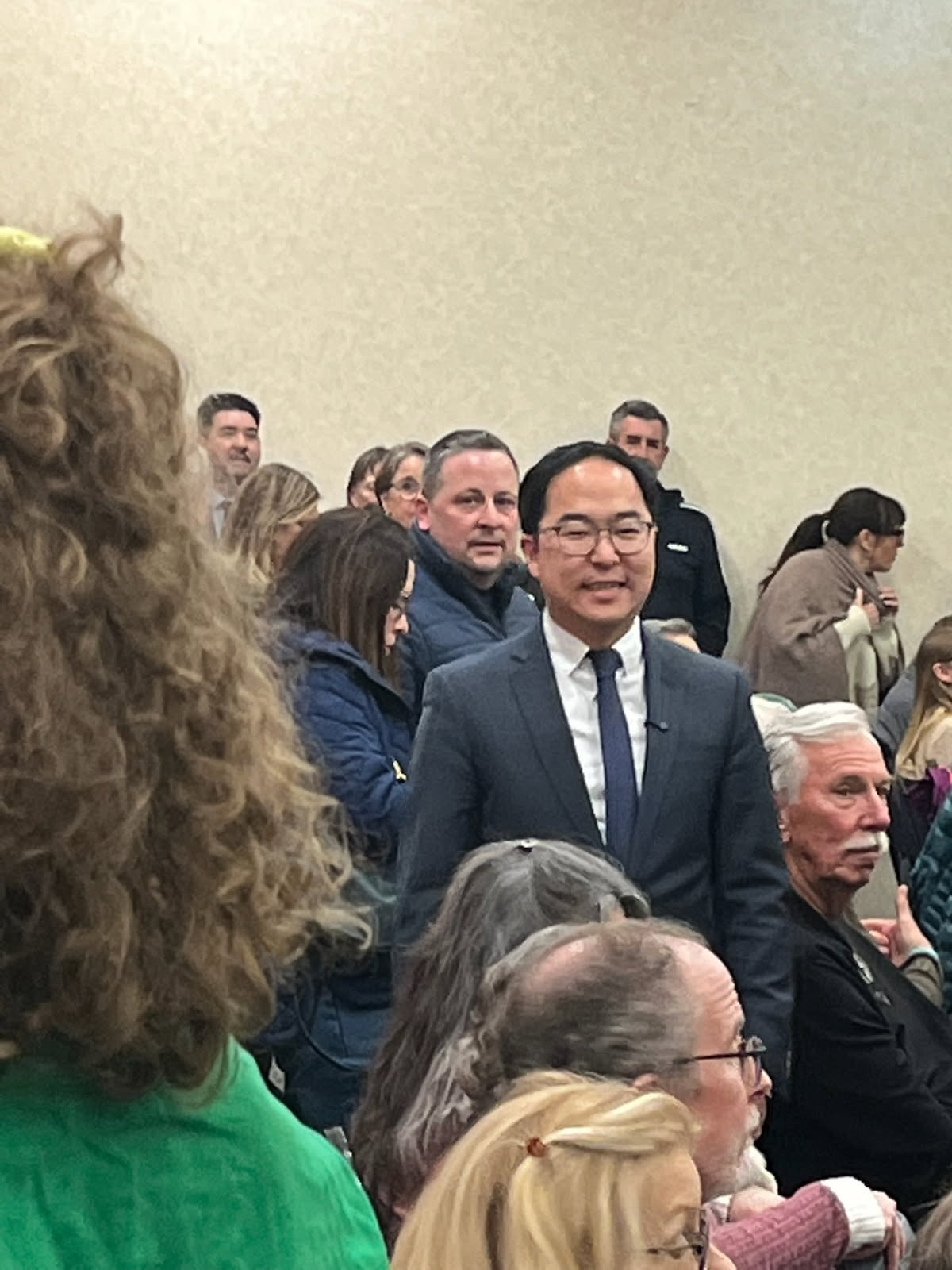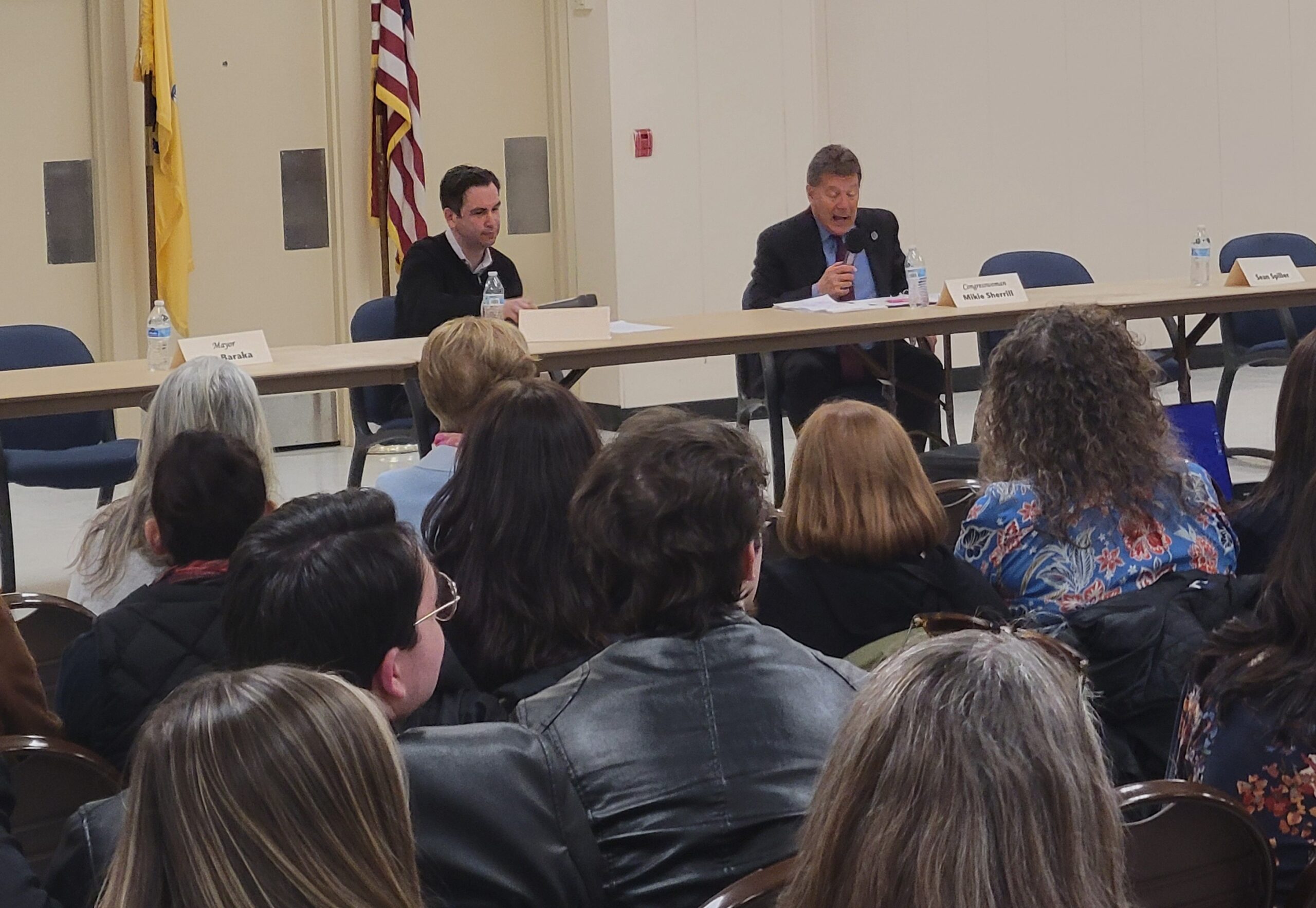
So, is there anything the Biden campaign can glean from Rep. Andy Kim’s recent winning streak in his quest for the Democratic Party’s nomination for the U.S. Senate seat now held by three times indicted Sen. Bob Menendez?
Polling indicates that Biden’s party has a major enthusiasm gap, the kind of energy that Rep. Andy Kim (D-NJ) seems to be generating.
Now, here in so-called Blue New Jersey, the Democratic Party is enmeshed in a no holds brawl between its organization that makes a living giving orders with its activist base that’s not on the payroll but appears drawn to Kim. It was this kind of ad hoc movement that helped to retire longtime incumbent Republican Rep. Rodney Frelinghuysen. Back in 2018, bowing to the pressure of a grassroots movement, the chair of the powerful Appropriations Committee, bowed out clearing the way for former Navy pilot and federal prosecutor Mikie Sherrill, a Democrat, to capture the 11th District seat that had been a Republican stronghold.
In three head-to-head county convention contests in Monmouth, Burlington and Hunterdon, Rep. Andy Kim is riding a wave of a similar kind of anti-establishment enthusiasm that resulted in lopsided delegate counts. Efforts by First Lady Tammy Murphy’s camp to line up New Jersey all powerful county chairs all with their own fiefdoms of patronage appears to have backfired so far with party activists that want to upend the status quo they see as always about nepotism and self-dealing.
Also In the mix are two imminently qualified Democratic Party primary candidates Larry Hamm, long time social justice activist and Dr. Patricia Campos-Medina, the executive director of the Worker Institute IRL-Cornell University. Their thoughtful candidacies reflect a growing demand for a deeper look at the issues than the Democratic Party’s state apparatus is capable of handling because so much of its energy is consumed with the spoils system it needs to maintain to fund itself. For this crowd, it’s not social change, it’s all about the big dollars.
On my drive time radio program on WBAI Celinda Lake, one of the nation’s most prescient pollsters, referenced the Democratic Party’s passion gap when she was talking about the need for the Democratic Party to engage the nation’s 85 million low wealth and low wage voters, fully one third of the electorate, a majority of which did not vote in 2016.
“It is even more critical in this election because there’s a real turnout problem for the Democrats and for progressives with a serious erosion of enthusiasm among some of the base voters including young people—this is the largest group of base voters out there—it’s huge– and in state after state where we won by 10,000 to 20,000 there are over a million people that didn’t participate,” Lake said. “In 2020 [these voters] could be absolutely game changing.”
Shock and awe may work with artillery but not in winning hearts and minds in a state weary with a political machine that produced and protected Bob Menendez until that machine wanted to hand the seat to Tammy Murphy.
“I think there’s a genuine revolt going on in the ranks in the Democratic Party,” former Democratic Sen. Robert Torricelli told Politico. “Tammy Murphy, who is not in public office, is now a symbol of the establishment. And there’s some admiration that Kim was the first to come out and challenge Menendez.”
And while nobody is expecting Donald Trump to carry New Jersey in November, the lack of voter engagement here is notable as was demonstrated when Gov. Phil Murphy eked out a narrow win in 2021 amidst one of the poorest voter turnouts “in a century,” according to NJ.com.
At 27 percent, the turnout for the recent New Jersey state legislature elections was even more abysmal despite “near record” campaign spending that broke $70 million reported NJ Spotlight, that amounted to about $40 a vote.
New Jersey’s Democratic Party has been uninspiring for a while now and there has been down ballot repercussions in at least two New Jersey House races that could determine who controls the House of Representatives and the course of the republic.
LACK LUSTER DOWN BALLOT
In New Jersey’s 2nd Congressional District in 2022, former Democratic Party member turned GOP Trump acolyte Rep. Jeff Van Drew beat his Democratic Party opponent Tim Alexander by 34,695. In 2008 President Obama carried that same district by almost 30,000. Despite a drop in voter turnout in 2012 statewide, Obama carried the 2nd District which includes all of Atlantic County and portions of Cape May, Cumberland, Gloucester, Ocean, and Salem counties.
In this district communities like Atlantic City and Bridgeton, where the population is overwhelmingly people of color who struggle week to week to get by, have tremendous electoral potential. These are the prospective voters that are part of that “sleeping giant” cohort that pollster Lake references must be mobilized if Democrats want to take back control of Congress from the avowed insurrectionists like Van Drew who voted NOT to certify Biden’s 2020 election AFTER the violent assault on the U.S. Capitol.
In the 7th Congressional District Republican Tom Kean Jr. bested Rep. Tom Malinowski (D) by just 9,000 votes in 2022. Talk about erosion—in 2008, when Rep. Leonard Lance (R) held the seat Obama carried it by a few thousand votes in a district that now has over 617,000 votes. According to the Columbia University study of the low wealth low wage cohort that’s a third of the electorate, less than half of these voters showed up. No doubt, the scandal over how Malinowski handled his stock market holdings hurt him by undercutting his identity as a Democrat looking to use the honor of public service to uplift others not himself.
But here, the New Jersey Democratic Party apparatus itself failed to exercise candidate quality control and was incapable of holding Malinowski accountable. And so, it left it to the voters. Once again, it subordinated a breach of the public trust, just as the Republican Party is doing with Donald Trump. ‘He’s our guy…’
At the root of the Murphy Kim face contest is a simple existential question. Just what is a political party for? Is it a wealth building machine that runs by concentrating power in the form of contracts and patronage to those that are loyal at the top of the power structure? Is it an organization of like-minded individuals who come together to collectively actualize a more perfect union that redeems America’s still unfulfilled promise?
Can it be both? Does the confluence of the homelessness crisis, the global climate crisis, the proliferation of military actions around the world, and America’s own gun violence epidemic require that we bust up the old apparatus that got us here? Is the machine the problem?
We are currently in a time of a level of wealth and privilege concentration which harkens back to the dynastic era of the Gilded Age of the Vanderbilts. Is the solution more dynasties? Both major political parties have played a role in building the 21st century wealth pyramid through their trade, fiscal and government policies.
FAILURE WHERE IT HURTS
At the same time, wealth and income disparities have reached historic highs as America’s global ranking in average life expectancy continues to plummet from 8th in the 1930s to 64th out of 195 countries in 2018, and that’s before the pandemic. Today, we consistently rank at the bottom of similarly situated large wealthy nations while vastly outspending our peer nations on healthcare.
These macro trends have alarming consequences that are profoundly troubling as we saw playout so tragically during the COVID pandemic that took 1.1 million lives, disproportionately people of color so often from the essential workforce who had to work in our hospitals, transit systems and service economy. New Jersey, at some points of the pandemic had the highest per capita death rate on the planet. It revealed stark race based disparities in healthcare coverage and outcomes that candidate Tammy Murphy has long advocated to address.
Yet, the only entities really holding the powerful hospital/insurance complex accountable are the state’s nurses unions like HPAE, 1199 SEIU, JNESO, and the United Steelworkers Nurses Local 4-200. You have to only look at the MIA status of the Middlesex County Democratic Party during the prolonged United Steelworkers Local 4-200 Nurses strike at Robert Wood Johnson University Hospital in New Brunswick to get a flavor for how the machine actually functions. As for Trenton Democrats, consider how Gov. Murphy’s chief of staff George Helmy, who during the bitter work stoppage went to work for the hospital chain that spent millions to try and discredit the union.
Consider the rebuff of the unions that represent the state’s essential workers that were looking for COVID hazard pay but were totally rebuffed by Trenton’s top Democratic leadership across the board who used the billions in pandemic federal aid to do things like upgrade their SUVs.
This hotly contested primary marks an long overdue rebuke to the Democratic Party organization that displayed military-like discipline when it opted to stand in support of Senator Menendez during his first corruption prosecution that ended in a mistrial for the former chair of the Foreign Relations Committee. It was a bit more of a roller coaster ride for his close friend and campaign patron Dr. Salomon Melgen who was sentenced to 17 years for defrauding Medicare of over $40 million while forcing patients to submit to what prosecutors said was “medically unreasonable and unnecessary tests and procedures.”
At a certain level of power Jersey’s key players all blend together showing up on President Trump’s pardon and commutation list. In the waning hours of his term Trump commuted Melgen’s prison sentence for committing one of the largest Medicare frauds in history. We’ll never know what would have happened if the same Greek chorus of incumbent Democrats that backed up Menendez had demanded he resign back then. Perhaps New Jersey voters would have been spared the indignity of a second and third Menendez indictment on charges the incumbent vehemently denies.
Also on that list of 146 folks that got a Trump reprieve was New Jersey developer and major Democratic Party donor Charles Kushner, Jared’s father. Kushner pled guilty to tax charges, retaliating against a witness as well as breaking campaign finance laws.
“Kushner further admitted at his plea hearing that he devised a scheme to retaliate against a cooperating witness – his sister – and her husband by having a prostitute seduce the husband and covertly filming them having sex,” according to the US Department of Justice press release in 2005. “Kushner admitted that he paid a private investigator $25,000 to arrange for the seduction and videotaping of the cooperating witness’ husband. Kushner admitted to personally recruiting the prostitute and instructing that the videotape be mailed to the cooperating witness.”
The elder Kushner was former Gov. Jim McGreevey’s major campaign donor who McGreevey nominated to chair the Port Authority of New York and New Jersey. Kushner’s nomination grounded in 2003 when he balked at answering questions from legislators about his campaign finance practices that got him indicted a year later.
On August 12, 2004 Gov. McGreevey proclaimed he was gay and admitted to engaging in an “adult consensual affair with another man, which violates my bonds of matrimony. It was wrong. It was foolish. It was inexcusable….I realize the fact of this affair and my own sexuality if kept secret leaves me, and most importantly the governor’s office, vulnerable to rumors, false allegations, and threats of disclosure. So I am removing these threats by telling you directly about my sexuality.”
McGreevey continued. “Given the circumstances surrounding the affair and its likely impact upon my family and my ability to govern, I have decided the right course of action is to resign.”
Yet, the disgraced Governor who had attempted to reward Charles Kushner, his top donor with the ultimate patronage spot as chair of the Port Authority, cynically opted to stay in office until November 15th, holding on as Governor long enough to preclude a special election so that Dick Codey could succeed him. Take care of the machine and the machine takes care of you and its softer landings all the way around.
Now, he’s running for Mayor in Jersey City.
A RIGGED SYSTEM
Clearly the Murphy vs. Kim contest is not happening in isolation. This dissatisfaction has been building for years with one criminal conviction for political corruption after another ensnaring members of both political parties laying the foundation for more of the same.
Back in May, an FDU Poll found “most New Jersey residents say that politicians in the state are ‘very’ or ‘somewhat’ corrupt, and they’re only a little more positive about their own representatives in state and local government. According to the latest results from the FDU Poll, 80 percent of New Jersey residents say that the state’s politicians are at least ‘a little’ corrupt, a view driven by partisanship and views of Governor Phil Murphy.”
In their recent New York Times op-ed Katherine J. Cramer and Jonathan D. Cohen headlined “Many Americans Believe the Economy is Rigged” the authors described the results of a American Academy of Arts & Sciences research project that flagged a widely held belief that “the rich and powerful have designed the economy to benefit themselves and have left others with too little or with nothing at all.”
“Over the past two years, as part of a project with the American Academy of Arts and Sciences, we and a team of people conducted over 30 small-group conversations with Americans from almost every corner of the country, Cramer and Cohn write. “While national indicators may suggest that the economy is strong, the Americans we listened to are mostly not thriving. They do not see the economy as nourishing or supporting them. Instead, they tend to see it as an obstacle, a set of external forces out of their control that nonetheless seems to hold sway over their lives.”
The authors continued. “While direct government assistance early in the pandemic certainly helped many in 2020 and 2021, millions of households still struggled to get food, and many millions fell behind on rent. These feelings of instability do not dissipate quickly, especially when rising prices make trips to the store adventures in budgetary arithmetic and the threat of an accident or a surprise medical bill looms around every corner.”
“The political system is supposed to make all this better. Instead, even as both major parties have vied to cast themselves as the standard-bearer of the working class, many Americans see politicians as unable or unwilling to do anything to help them,” Cramer and Cohen observed.
Wonder what these focus groups would have thought about Tammy Murphy’s candidacy?
(Visited 66 times, 66 visits today)
In recent years, the case of Murphy v. Kim has had a significant impact on democracy in the United States. The case, which centered around a dispute over the validity of certain ballots in a local election, has raised important questions about the role of political parties in the democratic process.
At the heart of the case was a challenge to the results of a local election in which a candidate from the Democratic Party, Murphy, narrowly defeated a candidate from the Republican Party, Kim. Kim alleged that certain ballots were improperly counted, leading to Murphy’s victory. The case ultimately made its way to the Supreme Court, where the justices ruled in favor of Murphy, upholding the election results.
The implications of this decision are far-reaching. On one hand, it reaffirms the importance of respecting the outcome of elections and upholding the will of the voters. This is essential for maintaining the integrity of the democratic process and ensuring that elected officials are chosen fairly and legitimately.
On the other hand, the case raises concerns about the influence of political parties on the electoral process. In this case, the Democratic Party was able to successfully defend the election results, leading some to question whether party loyalty played a role in the outcome. This has sparked a broader debate about the role of political parties in democracy and whether they should have such a significant impact on electoral outcomes.
Ultimately, the impact of Murphy v. Kim on democracy will depend on how these questions are addressed moving forward. It is crucial for policymakers, activists, and citizens alike to consider the implications of this case and work towards ensuring that elections are conducted fairly and transparently, free from undue influence or manipulation.
In conclusion, Murphy v. Kim serves as a reminder of the importance of upholding democratic principles and ensuring that elections are conducted in a manner that is fair and just. The case highlights the complex relationship between political parties and democracy and underscores the need for ongoing vigilance in safeguarding the integrity of the electoral process. Only by addressing these issues head-on can we ensure that democracy remains strong and vibrant in the years to come.



